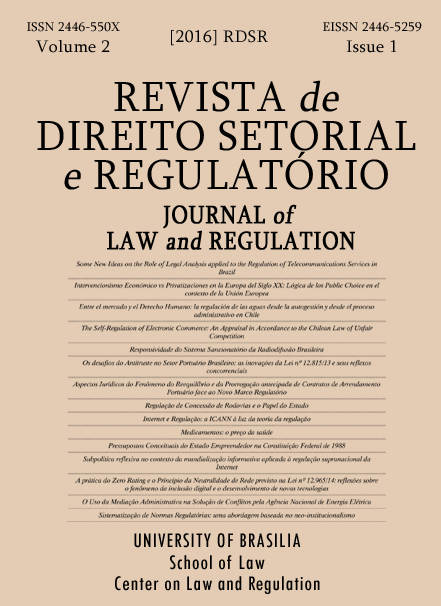Reflexive Sub-Politics in the context of Globalization of Information and the Internet Supranational Regulation
Palabras clave:
governança digital, direito global, regulação da internet, mundialização informativa, subpolítica reflexivaResumen
Purpose ”“ The World Wide Web is emerging not only as a mean of communication but serves as instrumental to the exercise of rights, including participation in sub-politics, so that becomes the interest of the individual put up as participatory actor in the process of discussion of its regulation. In this way, this paper addresses the following research question: Can reflective sub-politics be identified in the comparative scenario of multiple players acting in the regulation of Internet features?
Methodology/approach/design ”“ From the outset, the paper earmarks as relevant the understanding of the position of multiple players in the scenario of Internet regulation, which is possible only by supranational law comparative study contextualized with regard to sub-politics. The empirical basis of this paper lies in conferences of the United Nations, the Organization of American States, the European Union and the European Council. Its theoretical basis is focused on Ulrich Beck and Anthony Giddens and the concept of reflexive modernity associated with the policy, forming what is called reflexive sub-politics.
Findings ”“ The paper has proved the hypothesis that, regarding regulation of Internet, agendas emerge about Internet regulation that are every step less restricted to the traditional regulatory actors, allowing a greater participation of the individual in this process, with the possibility of designing sub-politics in a more simplified concept of globalization.
Practical implications ”“ The article provides to the scientific community and the society cognitive foundations necessary for inclusion of social actors in virtual spaces in the field of supranational regulation of new information technologies.
Originality/value ”“ The terms globalization and mundialization have multiple meanings, which does not diminish the importance of understanding them scientifically. It is clear that the phenomenon of mundialization requires the recognition that it should not be perceived as something restricted to the states. The relevance of the subject has not been accompanied by sufficient scientific production in the field.
Referencias
ARANHA, Marcio Iorio. Manual de Direito Regulatório. 3. ed. Londres: Laccademia Publishing, 2015.
______. Mundialización informativa, informacional y cultural. Política y Cultura, Distrito Federal, México, n. 26, 2006.
ARENDT, Hannah. A condição humana. 10. ed. Tradução Roberto Raposo. Rio de Janeiro: Forense, 2007.
BALDWIN, Robert; CAVE, Martin; LODGE, Martin. Understanding Regulation: theory, strategy, and practice. 2. ed. Oxford: Oxford University Press, 2013.
BAUMAN, Zygmunt. Globalização: as consequências humanas. Tradução Marcus Penchel. Rio de Janeiro: Jorge Zahar Ed., 1999.
BECK, Ulrich. O que é globalização? Equívocos do globalismo, respostas à globalização. São Paulo: Paz e Terra, 1999.
______. A reinvenção da política: rumo a uma teoria da modernização reflexiva. In: BECK, Ulrich; GIDDENS, Anthony; LASH, Scott. Modernização reflexiva: política, tradição e estética na ordem social moderna. Trad. Magda Lopes. São Paulo: Editora Unesp, 1995. p. 11-72.
BERTONI, Eduardo. A CIDH ouviu em audiência o impacto da Internet na defesa e no exercício dos Direitos Humanos. Digital Rights, n. 24, ano 3, jun./2015. Disponível em: <http://www.digitalrightslac.net/pt/la-cidh-escucho-en-audiencia-el-impacto-de-internet-en-la-defensa-y-el-ejercicio-de-los-derechos-humanos/>. Acesso em: 06 ago. 2015.
BRASIL. Câmara dos Deputados. E-democracia. Disponível em: <http://edemocracia.camara.gov.br/>. Acesso em: 06 ago. 2015a.
______. Comitê Gestor da Internet no Brasil. Disponível em: <http://www.cgi.br/>. Acesso em: 06 ago. 2015b.
CAMPILONGO, Celso Fernandes. Teoria do Direito e globalização econômica. In: SUNDFELD, Carlos Ari; VIEIRA, Oscar Vilhena. Direito global. São Paulo: Max Limonad, 1999. p. 77-92.
COMPARATO, Fábio Konder. A afirmação histórica dos direitos humanos. 3. ed. São Paulo: Saraiva, 2004.
CONSELHO DA EUROPA. Busca de notícias e documentos (palavra-chave: “Internet”). Disponível em: <https://publicsearch.coe.int/Pages/results.aspx?k=internet#k=internet#s=91>. Acesso em: 05 ago. 2015.
DENARDIS, Laura. The emerging field of Internet governance. In.: DUTTON, William H. The Oxford Handbook of Internet Studies. Oxford: Oxford University Press, 2013. p. 555-575.
EL PARLAMENTO Europeo alerta contra la posibilidad de que la ONU “controle” Internet. ELMUNDO.es, 23 nov. 2012. Disponível em: <http://www.elmundo.es/elmundo/2012/11/23/navegante/1353657275.html>. Acesso em: 06 ago. 2015.
FOUNTAIN, Jane. Construindo um Estado Virtual. Brasília: ENAP, 2005.
GARCIA, Bruna Pinotti; LAZARI, Rafael de. Manual de Direitos Humanos. 2. ed. Salvador: JusPodivm, 2015.
GIDDENS, Anthony. A vida em uma sociedade pós-tradicional. In: BECK, Ulrich; GIDDENS, Anthony; LASH, Scott. Modernização reflexiva: política, tradição e estética na ordem social moderna. Trad. Magda Lopes. São Paulo: Editora Unesp, 1995. p. 73-134.
ITU ”“ UNIÃO INTERNACIONAL DAS TELECOMUNICAÇÕES. Key Areas of Action. Disponível em: <http://www.itu.int/en/action/Pages/default.aspx>. Acesso em: 06 ago. 2015.
LÉVY, Pierre. O que é virtual? Tradução Paulo Neves. São Paulo: Editora 34, 2005.
MELLO, Celso de Albuquerque. Curso de direito internacional público. 14. ed. São Paulo: Saraiva, 2000.
OEA ”“ ORGANIZAÇÃO DOS ESTADOS AMERICANOS. Comissão Interamericana de Direitos Humanos. Relatoria Especial para a Liberdade de Expressão. Liberdade de Expressão e Internet. Washington/EUA: OEA, 2013.
ONU ”“ ORGANIZAÇÃO DAS NAÇÕES UNIDAS. Busca de notícias e documentos (palavras-chave: “internet” e “ciberespaço”). Disponível em: <http://search.un.org/>. Acesso em: 06 ago. 2015.
______. United Nations E-Government Survey 2014: e-government for the future we want. Nova York: United Nations, 2014.
ONU: UM GRANDE passo para a privacidade na Internet. Human Rights Watch, 26 mar. 2015. Disponível em: <https://www.hrw.org/pt/news/2015/03/26/267606>. Acesso em: 06 ago. 2015.
PRADO, Otávio; RIBEIRO, Manuela Maia; DINIZ, Eduardo. Governo eletrônico e transparência: olhar crítico sobre os portais do governo federal brasileiro. In: PINHO, José Antonio Gomes de (Org.). Estado, sociedade e interações digitais: expectativas democráticas. Salvador: EDUFBA, 2012. p. 13-42.
SUNDFELD, Carlos Ari. A Administração Pública na era do direito global. In: SUNDFELD, Carlos Ari; VIEIRA, Oscar Vilhena. Direito global. São Paulo: Max Limonad, 1999. p. 158-168.
UNIÃO EUROPEIA. Agenda Digital. Disponível em: <http://ec.europa.eu/digital-agenda/telecoms-and-internet/#Article>. Acesso em: 05 ago. 2015.
VERONESE, Alexandre Kehrig. A judicialização de políticas públicas de telecomunicações e as demandas dos consumidores: o impacto da ação judicial. 2011. 386 f. Tese (Doutorado em Sociologia) ”“ Universidade do Estado do Rio de Janeiro, Rio de Janeiro, 2011.
Descargas
Publicado
Número
Sección
Licencia
Al enviar este documento a la Revista de Derecho, Estado y Telecomunicaciones, declaro que estoy aceptando los términos de Creative Commons Attribution 4.0 International (CC BY 4.0), disponible en http://creativecommons.org/licenses/by/4.0.


